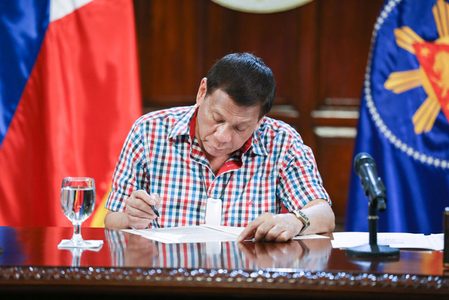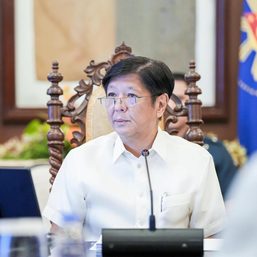SUMMARY
This is AI generated summarization, which may have errors. For context, always refer to the full article.
![[ANALYSIS] Legalizing plunder: Confidential and Intelligence Funds in the 2023 National Budget](https://www.rappler.com/tachyon/2023/04/TL-intelligence-funds-april-11-2023-1.jpg)
In a genuine democracy, transparency and accountability in government use of public money, taken from the people in the form of taxes, is supposed to be the standard rule and practice.
In the Philippines today, however, this is not the case. The administration of Ferdinand Marcos Jr. has allocated a whopping P9.28 billion in Filipino taxpayers’ money to the Confidential and Intelligence Funds (CIFs) of various government offices under the 2023 National Budget. Under a circular issued by five government agencies, these funds are exempted from the standard procedures of the Commission on Audit (COA), the government agency mandated by the 1987 Constitution to investigate government use of taxpayers’ money and ensure that these are spent properly and in accordance with law.
Justifications for these humongous allocations are the usual bogeymen: public order, national security, and the need for the state to defend itself against its enemies. Benefitting from this windfall are the Offices of the President, Vice President, and various government agencies, a good number of them not even engaged in national security and public order.
Despite serious questions raised by opposition legislators over these fund allocations, Congress has approved this proposal, with hardly a whimper and with minimal changes, and the President has promptly signed it into law. What it failed to justify with solid arguments, this administration and its allies in Congress succeeded with backroom maneuvers and railroading, using its control over the majority of both the House of Representatives and the Senate. Why indeed would the Lower House object if it is getting a hefty P12-billion increase over its previous annual share of the national budget, or a total of P28.6 billion? With this budget, who needs a pork barrel?
Is this practice of allocating huge sums of public money as CIFs legal and constitutional? Are there laws to back it up? Apparently, the answers are no, and none. There are only guidelines on the definition and use of the CIFs, contained in Joint Circular No. 2015-01, issued in 2015 by, ironically, the COA, Governance Commission for Government-Owned and Controlled Corporations (GCG), and the Departments of Budget and Management (DBM), National Defense (DND), and Interior and Local Government (DILG).
The circular defines CIFs as lump sum allocations in the national budget for expenses on surveillance and intelligence information-gathering activities.
Based on the circular, confidential funds are for expenses related to surveillance activities in civilian government agencies that are intended to support their mandate or operations. Intelligence funds are for intelligence information-gathering activities of uniformed and military personnel and intelligence practitioners with direct impact on national security.
National government agencies (NGAs) can get both confidential and intelligence funds while local governments and government-owned and -controlled corporations (GOCCs) can only get confidential funds.
The circular requires CIF recipients to prepare a physical and financial plan supporting their request for such funds and containing the estimated amount per project, activity, and program. However, COA auditing is confined to reports produced by CIF recipients on how they spent the funds. Also, the auditing of such funds must remain confidential (secret). In short, no effective and substantial auditing can be done on the use of these funds, and the recipients can use the money any way they want, without public scrutiny of any kind, so long as they can manufacture plans and reports that justify their expenses.
To allay concerns and criticisms, Senate President Juan Miguel Zubiri issued Senate Resolution 302 creating an oversight committee tasked to monitor CIF use. But Congress is hamstrung by the very same guidelines of the joint circular on CIFs, so Zubiri’s move is meaningless.
The CIFs and the circular on them are actually violations of the Constitution, especially provisions on transparency and accountability in the use of public funds, in particular, Sections 27 and 28 of Article II, Declaration of Principles and State Policies:
Section 27: The State shall maintain honesty and integrity in the public service and take positive and effective measures against graft and corruption.
Section 28: Subject to reasonable conditions prescribed by law, the State adopts and implements a policy of full public disclosure of all its transactions involving the public interest.
These also violate Section 3 of Article IX-D, on the Commission on Audit:
Section 3. No law shall be passed exempting any entity of the Government or its subsidiary in any guise whatever, or any investment of public funds, from the jurisdiction of the Commission on Audit.
CIF allocations are also a creative way to get around Republic Act 7080, the Anti-Plunder Law, and Republic Act 7659, an amendment to this law. Under the original Anti-Plunder Law, for ill-gotten wealth to qualify as plunder, the minimum amount amassed, accumulated, or acquired should be at least P75 million. Under RA 7659, an act reimposing the death penalty on certain heinous crimes including plunder, this minimum amount was further lowered to P50 million.
A review of specific CIFs allocations in the national budget shows that various government agencies have received CIFs way in excess of the minimum amount for plunder. This applies to the Office of the President, P4.56 billion; Office of the Vice President, P500 million; and Department of Education (DepEd), P150 million. The Department of National Defense (DND) CIF falls slightly below the minimum at P47 million.
Recipients of the biggest confidential funds exceeding the minimum for plunder were the Philippine Drug Enforcement Agency (PDEA), P500 million; National Bureau of Investigation (NBI), P175 million; Department of Justice (DoJ), P168.04 million; DILG, P100.6 million; National Security Council, P90 million; Ombudsman, P51.47 million; and Department of Foreign Affairs (DFA), P50 million. Falling below the minimum were the Department of Social Welfare and Development (DSWD), P20 million; Department of the Environment and Natural Resources (DENR), P13.95 million; Office of the Solicitor General, P 19.2 million; and National Intelligence Coordinating Agency (NICA), P1 million.
Way above the limit among recipients of intelligence funds are the National Task Force to End Local Communist Armed Conflict (NTF-ELCAC), the multi-agency task force under the Office of the President, P10 billion; Armed Forces of the Philippines (AFP), P1.5 billion; Philippine National Police (PNP), P806 million; and NICA, P140.2 million.
Tasked with red-tagging perceived government critics and suspected communist rebels and front organizations, the NTF-ELCAC receives its budget from 18 government agencies: the Office of the President, DND, DepEd, DILG, DOJ, DepEd, DBM, DSWD, NICA, AFP, and PNP; the Departments of Finance (DOF), Public Works and Highways (DPWH), and Agrarian Reform (DAR); National Commission on Indigenous Peoples (NCIP); Office of the Presidential Adviser on the Peace Process (OPAPP), National Economic and Development Authority (NEDA); and Technical Education and Skills Development Authority (TESDA).
CIFs are blatant violations of the Constitution and represent the most creative way to date to get away with plunder. With the cloak of secrecy provided by a mere government circular and the enactment into law of a national budget with huge CIFs, beneficiary agencies can spend the money anyway they want. Unfortunately, those in a position to file a case on it have done nothing. And amid the ongoing campaign to change provisions of the 1987 Constitution, one wonders whether the drive is on to make plunder, the worst form of corruption, a legal, constitutional, and acceptable act. – Rappler.com
Daniel Agoncillo has worked as an editor in various newspapers for 17 years. He is currently writing and editing for the Institute for Studies in Asian Church and Culture (ISACC).
Add a comment
How does this make you feel?

![[In This Economy] Why Marcos is getting high on unprogrammed funds](https://www.rappler.com/tachyon/2024/07/TL-marcos-program-funds-july-19-2024.jpg?resize=257%2C257&crop=265px%2C0px%2C720px%2C720px)
![[In This Economy] Is the Marcos government unlawfully dipping into PhilHealth funds?](https://www.rappler.com/tachyon/2024/07/marcos-government-philhealth-funds-july-12-2024.jpg?resize=257%2C257&crop=425px%2C0px%2C1080px%2C1080px)



There are no comments yet. Add your comment to start the conversation.